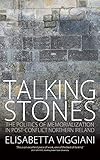Talking Stones : The Politics of Memorialization in Post-Conflict Northern Ireland / Elisabetta Viggiani.
Material type: TextPublisher: New York ; Oxford : Berghahn Books, [2014]Copyright date: ©2014Description: 1 online resource (288 p.)Content type:
TextPublisher: New York ; Oxford : Berghahn Books, [2014]Copyright date: ©2014Description: 1 online resource (288 p.)Content type: - 9781782384076
- 9781782384083
- 941.60824 23
- online - DeGruyter
| Item type | Current library | Call number | URL | Status | Notes | Barcode | |
|---|---|---|---|---|---|---|---|
 eBook
eBook
|
Biblioteca "Angelicum" Pont. Univ. S.Tommaso d'Aquino Nuvola online | online - DeGruyter (Browse shelf(Opens below)) | Online access | Not for loan (Accesso limitato) | Accesso per gli utenti autorizzati / Access for authorized users | (dgr)9781782384083 |
Browsing Biblioteca "Angelicum" Pont. Univ. S.Tommaso d'Aquino shelves, Shelving location: Nuvola online Close shelf browser (Hides shelf browser)

|

|

|

|

|

|

|
||
| online - DeGruyter Up, Down, and Sideways : Anthropologists Trace the Pathways of Power / | online - DeGruyter Food in Zones of Conflict : Cross-Disciplinary Perspectives / | online - DeGruyter Hunters, Predators and Prey : Inuit Perceptions of Animals / | online - DeGruyter Talking Stones : The Politics of Memorialization in Post-Conflict Northern Ireland / | online - DeGruyter Mixed Matches : Transgressive Unions in Germany from the Reformation to the Enlightenment / | online - DeGruyter Women and the City, Women in the City : A Gendered Perspective on Ottoman Urban History / | online - DeGruyter The Polynesian Iconoclasm : Religious Revolution and the Seasonality of Power / |
Frontmatter -- Contents -- List of Figures -- List of Tables -- Foreword -- Acknowledgements -- List of Abbreviations -- Introduction: Memorials as Silent Extras or Scripted Actors? -- Chapter 1. Collective Memory and the Politics of Memorialization: A Theoretical Overview -- Chapter 2. The Armalite and the Paintbrush: A Brief History of Memorialization of the Troubles in Northern Ireland -- Chapter 3. The ‘Landscape of Memorialization’ in Belfast: Spatial and Temporal Reflections -- Chapter 4. The ‘Memory Makers’ and the Projection of Narratives of the Troubles -- Chapter 5. The Clonard Martyrs Memorial Garden: Constructing a Dominant Republican Narrative -- Chapter 6. The IRSP/INLA Teach Na Fáilte Memorial Committee: Constructing a Sectional Republican Narrative -- Chapter 7. The 1913 UVF and the Myth of the Somme: Constructing a Loyalist ‘Golden Age’ -- Chapter 8. The UDA Sandy Row Memorial Garden: Attempting a Narrative of Symbolic Accretion -- Chapter 9. Dissecting Consensus: ‘Memory Receivers’ and the Narrative’s ‘Hidden Transcript’ -- Chapter 10. The Memory of the Dead: Seeking Common Ground? -- Appendix A: List of Memorials -- Appendix B: Emblems and Flags -- Bibliography -- Index
restricted access online access with authorization star
http://purl.org/coar/access_right/c_16ec
If memory was simply about past events, public authorities would never put their ever-shrinking budgets at its service. Rather, memory is actually about the present moment, as Pierre Nora puts it: “Through the past, we venerate above all ourselves.” This book examines how collective memory and material culture are used to support present political and ideological needs in contemporary society. Using the memorialization of the Troubles in contemporary Northern Ireland as a case study, this book investigates how non-state, often proscribed, organizations have filled a societal vacuum in the creation of public memorials. In particular, these groups have sifted through the past to propose “official” collective narratives of national identification, historical legitimation, and moral justifications for violence.
Mode of access: Internet via World Wide Web.
In English.
Description based on online resource; title from PDF title page (publisher's Web site, viewed 25. Jun 2024)


